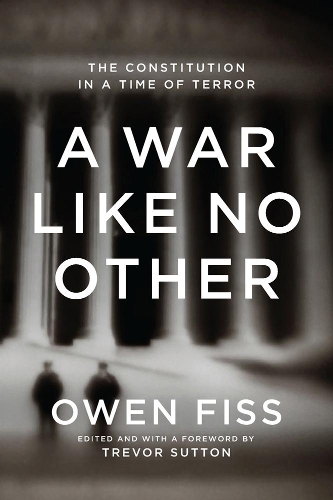
A War Like No Other: The Constitution in a Time of Terror
(Hardback)
Publishing Details
A War Like No Other: The Constitution in a Time of Terror
By (Author) Owen Fiss
Introduction by Trevor Sutton
Edited by Trevor Sutton
The New Press
The New Press
7th July 2015
United Kingdom
Classifications
General
Non Fiction
Terrorism, armed struggle
344.73053251
Physical Properties
Hardback
334
Width 146mm, Height 218mm
516g
Description
Owen Fiss has been a leading legal scholar for over 30 years, yet before 2001 it would have seemed unlikely for him to write about national security and the laws of war; his focus was civil procedure and equal protection. But, when the War on Terror began to shroud legal proceedings in secrecy, he realised that the bulwarks of procedure that shield the individual from the awesome power of the state were dissolving. A War Like No Other will be an essential intellectual foundation for all concerned about constitutional rights and the law in a new age.
Reviews
"In these extremely relevant pieces, Fiss once again emerges as a fierce defender of freedom."
Kirkus
This book addresses important legal and ethical questions about the war on terror. It is designed for law students, legal professionals, and readers with a thorough understanding of legal topics. Recommended for law and academic libraries.
Library Journal
Praise for Owen Fiss:
"Fiss is one of our most clear-eyed and hard-edged constitutional analysts, and this critique of the damage done to our constitutional heritage in the name of waging a war on terror is the most devastating I have seen."
Stanley N. Katz, professor of public and international affairs, Woodrow Wilson School, Princeton University
"Fiss provides an uncompromising critique of Americas struggle to maintain its most fundamental principles during the war on terrorism. Over the course of ten essays, Fiss makes a compelling case for how policies such as military commissions, targeted killing, torture, and warrantless surveillance have exposed rifts in the constitutional fabric. An essential contribution from one of the countrys foremost legal scholars."
Jonathan Hafetz, associate professor of law, Seton Hall University
"Does the Constitution authorize the U.S. government to interfere with privacy, to torture, to try some prisoners before military commissions and to allow others to languish in prison for prolonged, indefinite periods without a trial of any type, and to assassinate some individuals in foreign countries, even U.S. citizens, who are suspected of having engaged in terrorism Fiss opens a wide-ranging debate on these issues that is crucial for the United States and for billions of persons outside its borders."
Luis Moreno Ocampo, first Chief Prosecutor of the International Criminal Court
"Owen Fiss has written an important and troubling book."
Joshua Cohen, co-editor, The Norton Introduction to Philosophy
"Fiss is one of the truly magisterial figures in contemporary American legal academics. He commands nearly universal respect for the depth and lucidity of his intellect, for the integrity and passion of his character, and for the breadth and purity of his scholarship."
Robert Post, Dean of Yale Law School
"Fiss, a towering figure in the legal academy, brilliantly lays bare how our courts have failed the Constitution in the post-9-11 world."
Lawrence Douglas, James J. Grosfeld Professor of Law, Jurisprudence, and Social Thought, Amherst College
Praise for The Law As It Could Be:
"Owen Fiss is the moral compass of legal liberalismFiss calmly makes the case for unvarnished reason as the only and best guide to law and life[His work reveals] a profound faith that law can be not only the instrument of justice, but actually embody justice itself. Fiss's unswerving commitment to the possibilities of reason, justice, and law is more than timelyit is essential to the very project of the law."
Noah Feldman, author of After Jihad: America and the Struggle for Islamic Democracy
"An uplifting book."
Choice
"Fiss writes in the style of John Marshall, sweeping the reader along with vigorous argumentation."
The Law and Politics Book Review
Praise for The Irony of Free Speech:
"Powerfully reminds us that the flowering of individual autonomy also has costsatomism, social fragmentation and a public discourse that grows more inclusive and less intelligible at the same time."
New York Times
